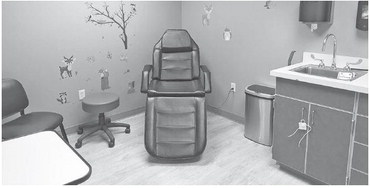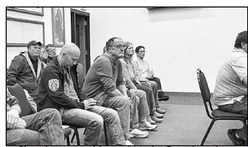Board delays action on childcare resolution
By Kevin O’Brien
Marathon County supervisors have delayed taking action on a resolution that calls for loosening childcare regulations and rejects the idea of providing additional government subsidies to families with children or daycare providers.
The board will reconsider the resolution at its December meeting after supervisors voted 25 to 12 on Tuesday to postpone any action.
Before voting on the resolution, several board members said they want to attend a town hall discussion planned for tonight at NTC in Wausau that will bring together local business leaders to focus on the childcare shortage and its impact on the local economy.
At a board meeting last Thursday, Dave Eckman, president of the Greater Wausau Chamber of Commerce, urged board members to come to the town hall and learn all they can about a “huge, complex” challenge that he says will require public-private partnerships to solve.
“We’re going to need county government,” he said. “This is not a time to sit on the sideline.”
The resolution, written by supervisor David Baker, cites a study by Dr. Angela Rachidi that blames overregulation by the state for a steep decline in lower-cost, home-based daycare providers since 2001. Her report, “Off Track: An Assessment of Wisconsin’s Early Care and Learning System for Young Children,” was published by the Badger Institute, an organization that supports limited government and free market solutions.
Baker said everyone agrees that a lack of affordable childcare is worsening worker shortages, but there are disagreements about the county’s role in addressing the issue.
“We’re not trying to end discussion with this resolution,” he said. “We would welcome continued discussion.”
Debate over the resolution was divided between supervisors who agreed that scrutinizing regulations is a good idea and those who thought it was counterproductive.
Supervisor Tim Sondelski said overregulation is “not sustainable without government subsidies,” and he advocated for a return to a tradition of one mother looking after several children at once. He referred to his grandmother growing up in a family of 13 siblings as an example.
“So, when the government tells you that only a very small number of children can be cared for by one care worker, that is a big lie,” he said, referring to a state regulation that limits a daycare provider to watching no more than three non-relative children at once.
Supervisor Dave Overbeck, however, said his past experience on Wausau Child Care’s board of directors taught him that regulations are used to establish minimum standards of care for providers to follow.
“If you take those standards away, you’re putting our children at risk,” he said. “I think that’s a very dangerous thing.”
Overbeck’s comments echoed those of Kay Palmer, president of Wausau Child Care, who told the board to think of regulations as “guardrails to keep our kids safe.”
“They serve a purpose,” she said. “I invite any of you to see how guardrails work in reality.”
In response, Baker pointed to criteria set by the state’s YoungStar rating system for doing on-site evaluations of daycare operations. Quoting Dr. Rachidi’s study, he said some of the criteria are “entirely subjective,” such as a requirement that all communication among staff and with children be “positive or at least neutral.”
“This level of government micromanagement constrains the number and types of childcare providers, restricting supply and driving up costs,” he said, quoting the study. “When providers cannot pass these higher costs onto families, policymakers across the political spectrum blame the childcare market rather than the government regulations that are driving up costs by restricting competition and increasing compliance costs.”
Some of the board’s discussion centered on a provision in Baker’s resolution to establish a “pilot program” to test the idea of reducing regulations “while still maintaining high standards of health and safety.”
Supervisor Ann Lemmer questioned how the county could run such a pilot program when it does not actually provide childcare and does not set licensing regulations. Baker said the county’s Social Services department has two employees who are responsible for certifying local childcare operations, and they could possibly spearhead a pilot program.
County administrator Lance Leonhard also confirmed Baker’s suggestion that the county board could ask the state to establish a pilot program.
Supervisor Tony Sherfinski said no one is suggesting that all childcare regulations be eliminated, but he believes government involvement inevitably drives up costs and, over the years, “perhaps we have become too rule-bound” when it comes to daycare providers.
“Our job is to try and clear the field of obstacles, and I think this resolution is a good-faith attempt to do that, so I certainly will be supporting it,” he said.
On Tuesday, however, supervisor Matt Bootz said “we owe it to the business community” to hear what they have to say about the issue before voting on the resolution, which he says he could not support until getting more information.
“We’re not shooting it down tonight,” he said. “We’re just saying ‘Give us another month – or time to be determined – to have somebody else look at this.”




